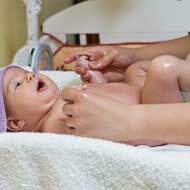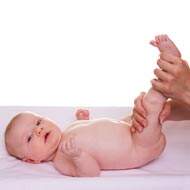The Gift of Touch - Infant Massage Training for Parents
In many cultures, the benefits of infant massage have been enjoyed for centuries. Infant massage is considered one of the best ways to promote social, physical and emotional development in babies. Today, massage is also valued as a therapeutic tool for infants and children with special needs.
In face of the growing body of evidence about the benefits of infant massage, lets look at the ways these simple touch techniques can help improve parent and child development…
Benefits for the Baby
Infant massage can help a baby in many ways such as:
- Helps the baby to relax
- Encourages better and deeper sleep
- Reduces colic
- Calms irritable and fussy babies
- Boosts serotonin levels that may help reduce the chances of SIDS (Sudden Infant Death Syndrome)
- Babies with special needs respond well to massages and massage strokes can be adjusted to meet their requirements
- Babies who are touched regularly and lovingly by their parents are more likely to have a secure relationship with their parents and with others
Benefits for the Parents
Infant massage does not only affect the baby. Parents also benefit as infant massage can:
- Improve bonding and intimacy between parents and child
- Provide an opportunity for fathers to bond with their children
- Encourage pre-verbal communication between parents and children
- Help ease stress in parents
- Offer quiet time with your infant
- Give parents tools for understanding their baby’s needs and patterns
- Teach parents how to read cues from their babies
Classes for Infant Massage – What You Need to Know
Parents in the US can now learn the techniques of this ancient healing practice and share with their infants the gift of touch. Certified courses are available with trained instructors to guide parents through each stroke and teach them simple massage techniques.
When choosing a baby massage class look for smaller groups or even individual sessions. This will give parents enough hands-on time and supervision with the instructor. Typical course sessions should last three to five weeks so that parents learn all the strokes gradually and the infants are given time to adjust to the massaging.
Basics of Infant Massage
The basics of infant massage include specialized massage strokes along with eye-to-eye contact between parent and child, vocalization and other behavioral reinforcements. Infant massages may or may not use oil though experts believe that oil on the skin helps reduce friction. Oils such as natural cold-pressed or organic oils are safe for use on an infant’s delicate skin. Oils such as almond oil, apricot oil and grapeseed oil are usually the best options. Mineral oils, nut oils or baby powder is not recommended for baby massages. Oils should also be unscented as perfumes can confuse babies and make them unable to recognize the scent and smell of their parents. When it comes to the best time of the day for an infant massage, most instructors recommend massaging your baby before or after a bath and never too close to feeding times. Infant massages generally last twenty to thirty minutes but this can vary depending on how much your baby enjoys the massage.
Precautions for Infant Massage
When massaging your baby, remember that babies are unable to regulate their own body temperature. Always perform the massage in a warm place without any drafts of cool air. Keep your time of massage consistent everyday so that your baby starts to look forward to the routine. Massage should be done when the baby is awake and not too fussy or irritable. Use gentle pressure and slow smooth strokes from head to toe. Premature babies or babies with special needs will need modified strokes that your course instructor can teach you. If your baby is unwell or has fever or diarrhea, skip the massage until he is better. Skin rashes or open cuts and sores should not be massaged either.
Read more articles from the General Discussion Category.

 Find Pose
Find Pose

